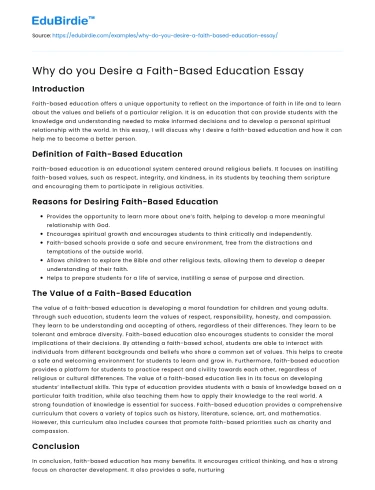Introduction
Faith-based education offers a unique opportunity to reflect on the importance of faith in life and to learn about the values and beliefs of a particular religion. It is an education that can provide students with the knowledge and understanding needed to make informed decisions and to develop a personal spiritual relationship with the world. In this essay, I will discuss why I desire a faith-based education and how it can help me to become a better person.
Definition of Faith-Based Education
Faith-based education is an educational system centered around religious beliefs. It focuses on instilling faith-based values, such as respect, integrity, and kindness, in its students by teaching them scripture and encouraging them to participate in religious activities.
Save your time!
We can take care of your essay
- Proper editing and formatting
- Free revision, title page, and bibliography
- Flexible prices and money-back guarantee
Reasons for Desiring Faith-Based Education
- Provides the opportunity to learn more about one’s faith, helping to develop a more meaningful relationship with God.
- Encourages spiritual growth and encourages students to think critically and independently.
- Faith-based schools provide a safe and secure environment, free from the distractions and temptations of the outside world.
- Allows children to explore the Bible and other religious texts, allowing them to develop a deeper understanding of their faith.
- Helps to prepare students for a life of service, instilling a sense of purpose and direction.
The Value of a Faith-Based Education
The value of a faith-based education is developing a moral foundation for children and young adults. Through such education, students learn the values of respect, responsibility, honesty, and compassion. They learn to be understanding and accepting of others, regardless of their differences. They learn to be tolerant and embrace diversity. Faith-based education also encourages students to consider the moral implications of their decisions.
By attending a faith-based school, students are able to interact with individuals from different backgrounds and beliefs who share a common set of values. This helps to create a safe and welcoming environment for students to learn and grow in. Furthermore, faith-based education provides a platform for students to practice respect and civility towards each other, regardless of religious or cultural differences.
The value of a faith-based education lies in its focus on developing students’ intellectual skills. This type of education provides students with a basis of knowledge based on a particular faith tradition, while also teaching them how to apply their knowledge to the real world. A strong foundation of knowledge is essential for success. Faith-based education provides a comprehensive curriculum that covers a variety of topics such as history, literature, science, art, and mathematics. However, this curriculum also includes courses that promote faith-based priorities such as charity and compassion.
Conclusion
In conclusion, faith-based education has many benefits. It encourages critical thinking, and has a strong focus on character development. It also provides a safe, nurturing environment where students can develop their faith without fear of persecution. Despite its many benefits, faith-based education is not without its criticisms. Some argue that it is too limiting and restricts students from exploring a variety of perspectives. Nonetheless, this education can provide students with an education that is based on values, which can shape the way they view the world and shape the choices they make. It is a valuable resource for those who choose it, and it is important that those who do have access to quality faith-based education.






 Stuck on your essay?
Stuck on your essay?

